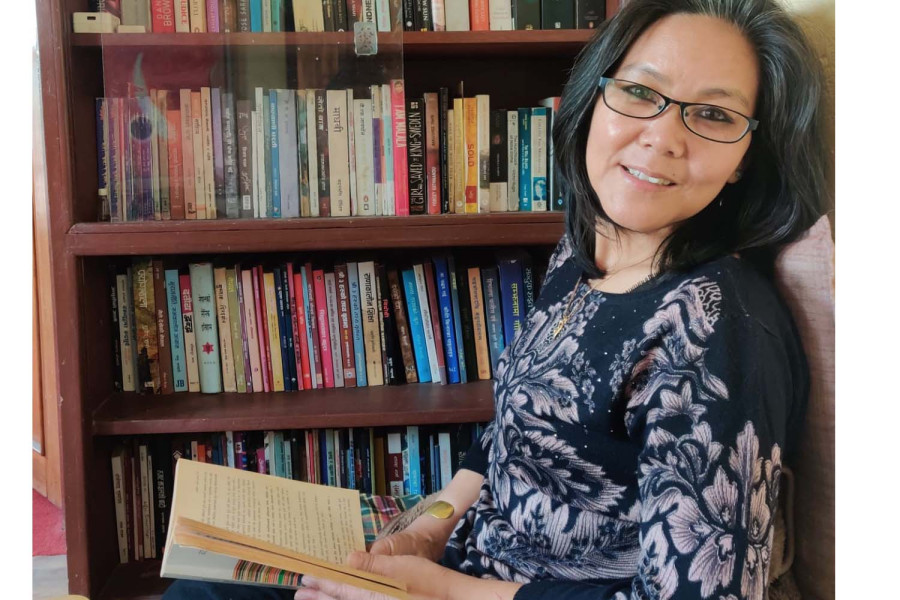Books
Female writers need more support
Writer Manisha Gauchan discusses how people she meets in real life influence her characters and her work as a creative freelancer.
Anish Ghimire
Manisha Gauchan is the author of four books, ‘Prativahan’ (2023), ‘Walliko Diary’ (2006), ‘Whitecane’ (2014) and a poetry collection ‘Phoolharuko Rang Chaina’ (2003). She also works as a freelancer in fields relating to writing and research.
Her writings are generally about social justice issues from the perspective of many individuals, their struggles and personal stories. She has also worked as a television journalist at Avenues Television and as a senior radio playwright for Antenna Foundation Nepal.
In this interview with the Post’s Anish Ghimire, Gauchan discusses reading, the books she authored and working as a creative freelancer.
You work as a freelancer in fields related to research, writing and dog rescue, but you said your main focus has always been writing. What made you choose writing as something you want to devote most of your time to?
Writing has become like living in a new world for me—a world filled with different lives, where I can embody any character. Through writing, I can live the life of a teenage girl, an elderly person, or a regular human being.
A motherless childhood exposed me to many characters—some sweet, some disturbing, and others hurtful. As I grew older and began to understand society, I saw the value of these characters not only in my psyche but also in poems, stories, and novels. My emotional sensitivity towards society led me down the path of becoming a writer.
Being a writer brings me happiness in many ways, but more than that, I am mindful of the impact my writing can have. I often wonder if my writing can contribute significantly to social change. I believe that writing may be a hobby for many, but to be a writer, one must reach the minds of readers through their writing skills. This requires continual learning and exploration of new ideas and knowledge.
My journey isn’t just that of a writer; it’s also one of a perpetual learner and explorer, unfolding with each new experience.
You mentioned that your childhood experiences birthed many characters found in your books. Does a writer’s background significantly shape their storytelling?
Absolutely. I remember back in fifth grade, I penned a poem titled ‘My School and My Aim’, which ended up winning the first prize. That ignited my passion for writing. From then on, I actively participated in literary competitions, growing increasingly enamoured with literature.
I wrote a play titled ‘Aama ko Trishna’ during my school years, which my teachers later brought to life on stage. Seeing tears streaming down the audience’s faces as they watched the play made me realise the power of storytelling. That play was a story born from the absence of a mother, drawing from my own life experiences.
While sometimes my personal life and experiences serve as inspiration for my writing, more often, it’s encounters with characters in our society and events unfolding around us that fuel my creative drive.
What's the book you find yourself returning to time and again?
There are a few books that draw me in so deeply that I find myself returning to them time and again. Currently, one such book on my shelf is ‘The Holy Monk and the Spirit Woman’ by Chinese author Xue-mo. Every time I open its pages, I’m drawn into the quest for truth and enlightenment depicted by the author.
One particular chapter that resonates with me tells the enchanting love story between the Holy Monk Khyungpo and a renounced female spirit, Devi, from Nepal. This tale touched my heart with its depth and emotional resonance.
I read the Nepali translation of this book translated by Sarwottam Shrestha, which beautifully captures the essence of the original.
What inspired you to write your recent book ‘Pratiwahan’? What message do the stories in the book convey?
‘Pratiwahan’ mainly consists of dark stories, some dating back a decade ago while others are entirely new. Discrimination is rampant in our society, fueled by prejudices based on gender, caste, economic status and social position. Moreover, there exists a particularly insidious form of discrimination based on physical and mental abilities, where people with disabilities often endure mistreatment not only in society but also within their own families.
I wrote these stories to give voice to these marginalised characters, shedding light on their struggles. Many of my stories delve into the psychology of characters who experience a profound sense of emptiness on various levels. Despite appearing socially and economically “normal” on the surface, they grapple with different forms of poverty, with the most significant being the lack of happiness itself.
These tales feature the sorrowful faces of individuals grappling with their inner turmoil, serving as a reminder of the complexities of human existence.
As a female writer, has your gender influenced the themes you write about or the way you write?
I’ve encountered the same struggles that many others face in their journey to become writers. Patriarchy runs deep and affects female writers all over the world. Virginia Woolf eloquently highlighted these obstacles in her essay, ‘A Room of One’s Own’, emphasising the necessity for women to have their own space and financial independence to pursue writing.
The situation for Nepali female writers reflects this reality. Despite possessing the talent and capability to write, many women find themselves confined to the role of homemakers due to the lack of conducive environments for reading and writing at home. Even if they manage to publish a book, they often struggle to receive adequate support in terms of promotion, honest feedback, and media coverage, rendering them at a disadvantage compared to their male counterparts. Our social structure dictates that women must juggle multiple roles, leaving little time for artistic pursuits. For many of us, the time dedicated to creating art is stolen time, squeezed in between household chores and employment.
I wrote my first novel, ‘Valliko Diary’, predominantly at night, as daytime was consumed by domestic responsibilities and work obligations. Similarly, my subsequent books were written during spare moments after work. As a full-time freelance writer, finding time can be challenging, but creating an environment conducive to writing is essential.
Do you think this scenario is changing anytime soon?
I feel the scenario is changing, albeit slowly. Alongside the ongoing social transformation, women have been increasingly asserting themselves as writers, both in terms of numbers and quality of work. There has been a noticeable shift in the perception of women writers, leading to a growing trust in their literary abilities.
National and international literary programmes are recognising the importance of female voices in literature, providing them with platforms and opportunities for exposure. Moreover, there has been a surge in positive media coverage of female writers.
Female writers today are eager to explore new ideas and perspectives, reflected in the diversity of themes and narratives in their books. Some publication houses are actively seeking out talented female writers, recognising their potential and value in the literary world.
Many people are drawn to the idea of working as a freelance writer. In your experience, how lucrative do you think the job is?
For individuals with good skills and connections, freelance writing can be a lucrative pursuit. Some organisations offer competitive compensation as well, although persuading them can be time-consuming. In our society, there is often a lack of awareness regarding creative endeavours, with many undervaluing them and hesitating to invest.
Writing is not just about sitting in one place and completing pages; it demands significant time and effort. While it’s encouraging to know that some writers succeed in film writing, but this alone isn’t enough to sustain you financially. Numerous writers are actively seeking opportunities, highlighting the need for strong investment in the creative sectors.
Manisha Gauchan’s book recommendations
Nirbandha
Author: Banira Giri
Publisher: Sajha Prakashan
Year: 1985
‘Nirbandh’ explores the intricacies of female psychology in response to the cruel actions of a male character, rooted in the authority bestowed upon him by society. It is a thought-provoking and rebellious piece of work that challenges patriarchal norms.
Beloved
Author: Tony Morrison
Publisher: Alfred A Knopf
Year: 1987
‘Beloved’ delves into the physical, emotional and spiritual devastation caused by slavery, which persist even after the characters have gained their freedom. Sethe, a mother in the story, tragically takes her daughter’s life to prevent her from being enslaved again.
Never Go Back
Author: Lee Child
Publisher: Bantam Press (UK)
Year: 2013
This is an enthralling detective tale with a hint of romance. It follows detective Jack Richard as he gets entangled with a woman. The novel offers insights into the protocols of the American Army and the obstacles commanders encounter on covert missions abroad.
The Holy Monk and the Spirit Woman
Author: Xue-Mo
Publisher: Encyclopedia of China Publishing House
Year: 2018
This novel immerses readers in the realms of fantasy, mystery and symbolism as it follows the journey of the protagonist, the Tibetan Holy Monk Khyungpo Naljor. Through various experiences along his journey, Khyungpo Naljor seeks the truth and ultimately attains spiritual enlightenment.
Laltinko Ujyaloma
Author: Saraswati Gyawali
Publisher: Akshar Creation
Year: 2018
‘Laltinko Ujyaloma’ is an autobiographical book on a mother’s journey with her disabled daughter, showcasing love that knows no bounds. The story also touches upon the sacrifices made by the wife to support her husband’s political ambitions. It’s a tale of women’s sacrifice, resilience and familial love.




 12.58°C Kathmandu
12.58°C Kathmandu










